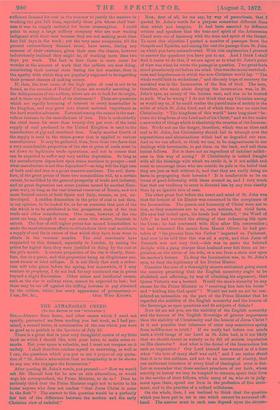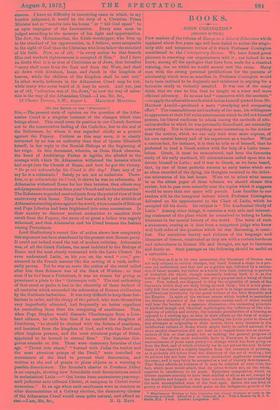THE ATMANASIAN CREED.
(TO THE EDITOR or THB " SPECTATOR...) SIR,—Absence from home, and other causes which I need not specify, prevented me from sending you last week, as I had pro- mised, a second letter, in continuation of the one which you were ' so good as to publish in the Spectator of July 20.
There is a great deal in your very thoughtful review of my little
book on which I should like, with your leave, to make some re- marks. But your space is valuable, and I must not trespass on it unduly. I shall therefore confine myself to answering, as well as I can, the questions which you put to me a propos of my quota- tion of "St. John's admonition that no hospitality is to be shown to any one who impugns the Incarnation."
After quoting St. John's words, you proceed :—" Now we would ask Mr. Maccoll how far he acts on this admonition, or would urge his correspondent, the Prime Minister, to do so ? Does he seriously think that the Prime Minister ought not to invite to his house anyone who does not confess "that Jesus Christ is come in the flesh"? The answer to this question would be a perfectly fair test of the difference between the modern and the early Christian view of unbelief."
Now, first of all, let me say, by way of parenthesis, that quoted St. John's words for a purpose somewhat different from. that which you imagine. It had been asserted by different. writers and speakers that the tone and spirit of the Athanasian Creed were out of harmony with the tone and spirit of the Gospel, To meet this objection I quoted a number of passages from the Gospels and Epistles, and among the rest the passage from St. John on which you have animadverted. With this explanation I proceed, to answer the questions you have put to me. And I think I shall' find it easier to do this, if we can agree as to what St. John's point- of view was when he wrote the passage in question. Two great facts stood prominently out before his mind. One was the moral wretched- ness and hopelessness in which the non-Christian world lay. " The whole world lieth in wickedness ;" and the only hope of recovery for mankind was in the Incarnation of the Son of God. The man, therefore, who went about denying the incarnation was, in St.. John's eyes, an enemy of the human race, and was to be treated. as such. WasIe wrong? I do not think that any Christian among us would say so, if he could realise the putrid state of society in the of which St. John lived, and of which there was no cure but "The kingdoms of this world" have long since "be- come the kingdoms of our Lord and of his Christ," and we live under a new order of things which is absolutely the creation of the Incarna- tion. Wedo not see the danger, therefore, which was so close and, real to St. John, lest Christianity should fail to triumph over the superstitions and abominations which had so degraded our race. And so we can afford, or think we can, to be magnanimous in our dealings with heresiarchs, to pat them on the back, and call them honest fellows. But is there not an ingredient of indolent selfish- ness in this way of acting? If Christianity is indeed fraught. with all the blessings with which we credit it, is it not selfish and- cruel to encourage those who are outside its pale in the belief that they are just as well without it, and that they are really doing no. harm in propagating their heresies ? It is comfortable to be on terms of good-fellowship with those around us, and I very much. fear that our tendency to error is dictated less by any true charity than by an ignoble love of ease.
The other great fact before the heart and mind of St. John was. that the honour of his Master was concerned in the acceptance of the Incarnation. The person and humanity of Christ were not to. him, as they sometimes are to us, mere notions, but vivid facts.. His eyes had looked upon, his bands had handled, " the Word of. Life ;" he had watched the ebbing of that redeeming life upon the Cross ; he had conversed with Him after His resurrection ;. he had witnessed His ascent from Mount Olivet; he had par- taken of "the promise from the Father" imparted on Pentecost. And now to be told that this was all a myth, and that Jesus a Nazareth was not very God,—this was to smite the beloved. disciple with a pang sharper than husband ever felt from an im- putation on the virtue of his wife, or a son from a stain cast upon, his mother's honour. To deny the Incarnation was, in St. John's- eyes, to deny the legitimacy of his Divine Master.
Conceive the case of a thoroughly sincere enthusiast going about the country preaching that the English monarchy ought to be abolished, and affirming, by way of clinching his argument, that- Queen Victoria was a bastard. Would the man's sincerity be any excuse for the Prime Minister in " receiving him into his house and " bidding him God speed " ? Would not such an act be con- sidered an intimation on the part of the Prime Minister that he. regarded the stability of the English monarchy and the honour of. the Sovereign as open questions and fit subjects of debate?
Now let me ask you, are the stability of the English monarchy and the honour of the English Sovereign of greater importance than the stability of Christianity and the honour of Jesus Christ ?. Is it not possible that tolerance of error may sometimes spring from indifference to truth ? If we really had before our minds- such a vivid image of our Lord as St. John had, is it not likely that we should resent as warmly as he did all serious imputation on His character ? And what is the denial of the Incarnation but. such an imputation ? Our Lord himself has warned us of a time' when "the love of many shall wax cold," and I am rather afraid. that it is to this coldness, and not to an increase of charity, that our exuberant tolerance of every kind of theological error is due.. Let us remember that those ancient preachers of our faith, whose- severity to heresy we may be tempted to censure, spent their lives in the service of their fellows, while many of us, who sit in judg- ment upon them, spend our lives in the profession of fine send :sent, and in the practice of a refined selfishness.
On the whole, then, I am inclined to think that the question- which you have put to me is one which cannot be answered off- hand. The answer must in each case depend upon the eircum-
stances. I have no difficulty in conceiving cases in which, in my humble judgment, it would be the duty of a Christian Prime Minister not to "receive into his house " or " bid God speed" to an open impugner of the Incarnation. Every man must be judged according to the measure of his light and opportunities. The Jew, the Mohammedan, the fetish-worshipper, who lives up to the standard of his opportunities, is, I believe, more acceptable in the sight of God than the Christian who lives below the standard of his faith. Now, as of old, "in every nation he that feareth Him and worketh righteousness is accepted of Him." And I have no doubt that it is as true of Christians as of Jews, that hereafter "many shall come from the East and from the West, and shall it down with Abraham, Isaac, and Jacob in the kingdom of heaven, while the children of the kingdom shall be cast out." In other words, believers in the Athanasian Creed may be lost, while many who never heard of it may be saved. And yet, just as of old, "salvation was of the Jews," so now the way of salva- tion is the way of the Athanasian Creed.—I am, Sir, &c., 12 Chester Terrace, S. W., August 1. MALCOLM Maccom..



































 Previous page
Previous page